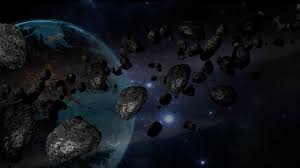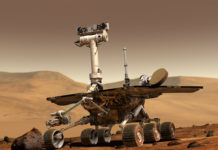According to NASA scientists, we’ll witness some close encounters with large asteroids heading toward Earth this month. One of these rocks is larger than the Empire State Building. When traveling at speeds greater than 10,000 miles per hour, rocks of this size can cause devastating destruction if they happen to impact near a major city.
Is this any reason for people to worry or make preparations? Scientists say no. Experts at the Planetary Defense Coordination Office who monitor these large asteroids say that the biggest one is greater than 1,800 feet wide, and it will come within 5 million miles of Earth. This is much further away than the moon, but it is still considered close enough to warrant monitoring in case its course changes in the future.
The largest of the 6 asteroids headed toward Earth is designated as 2006 QQ23, and scientists have classified it as a near-Earth asteroid. Its diameter of 1,870 feet makes it much larger than the Empire State Building which is 1454 feet tall.
The news of these 6 large asteroids follows a near-miss event that occurred in July. Scientists were somewhat alarmed because they were completely unaware of the object until it came within 45,000 miles of Earth. This distance is closer than the moon and very close in astronomical terms.
Scientists say that last month’s asteroid, named 2019 OK, was classified as a “city killer” with an impact energy of over 30 times greater than the atomic bomb that detonated at Hiroshima. The object was the size of a large boulder, but it was traveling at a tremendous velocity of over 54,000 miles per hour. Astronomers say that they were unaware of the object because its path was obscured by its proximity to Venus, and it was directly in front of the Sun during its flight toward Earth.
An object of this size approaching Earth is a relatively common event. On average, about 6 asteroids of this magnitude fly by Earth every year. NASA is currently monitoring about 900 space objects of 3,280 feet or more in diameter that are classified as near-Earth objects.
NASA does not believe that Earth is threatened by any major asteroid impacts in the near future, but they still want to be prepared if some unforeseen event occurs. They are currently developing a system called Double Asteroid Redirection Test (DART). The defense system will deploy a spaceship that can hit an asteroid with enough force to redirect its path away from Earth.






